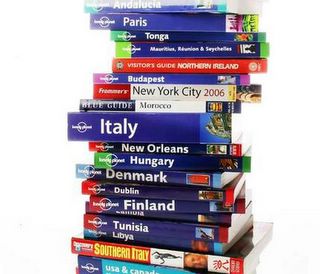
Guidebooks/Rodger Cummins
Somebody named Anonymous posted a comment on this site a few weeks ago, and left behind several suggested websites about travel writer scams, including a link to Preditors and Editors. Loads of great stuff here including these useful tips for writers dipping their toes into the sometimes perilous world of publishing.
Some General Rules for Spotting a Scam Publisher
Openly advertises for writers in print or online publications or both.
Openly claims that it's not a vanity or subsidy publisher.
Claims that it has a new business model that will bring success, but never explains why other successful publishers aren't utilizing it.
The publisher gives no or very low advances for books it buys.
The publisher's books are rarely in any bookstores, particularly the large chain stores that carry books from just about all reputable commercial publishers.
The publisher's books have never been seen on a bestseller list published by a reputable source such as the New York Times, especially when said publisher claims to be large.
The publisher's books rarely sell more than 5,000 books to readers in individual purchases and more often fail to reach that number.
The publisher refuses to release even approximate sales figures for its own bestsellers.
When confronted with very low or non-existent sales, the publisher refuses to release the book from contract.
Books it claims to have published were actually published by another publisher, now defunct, that used the same business name.
Its contracts contain provisions that prohibit complaints by its authors about its service and product.
Postings in online forums never seem to include anyone who was rejected.
Online forum criticism is frequently immediately responded to by a defender of that publisher.
Acceptances usually take place in less than a month. Even less than a week is not unusual.
Acceptance letters tend to be identical when compared with what other authors received.
Contract provisions are specific as to how termination can be invoked, but the publisher disdains using anything other than some other method of communication.
Communications from the publisher are frequently unsigned by any individual using a department address so that no one can be pinned down as responsible for any comments made to the author.
The publisher never gives a direct answer to any direct questions. Instead, the publisher points to others who are satisfied with policy, procedures, contract, or sales as proof that everything is fine.
The publisher has a no return policy on its products.
The publisher threatens to blacklist its authors within the industry should they mention leaving.
Some General Rules for Spotting a Scam Literary Agency
Openly advertises for writers in print or online publications or both.
Claims that it has new methodology for gaining access or acceptance with book publishers, but never explains why other successful agencies aren't utilizing it.
Does not list any sales or refuses to divulge the titles of sales for confidentiality reasons.
The only sales it lists are for vanity or subsidy publishers or the sales it lists were made by the author before the author signed with the agent, often years before representation.
Sales it claims to have made cannot be found listed in any reference lists of books that were printed by the supposed publisher.
Sales it made were mostly to a publishing house wholly or partially owned by the agency.
Requires an upfront payment for administration or for a web display or for later postage and copying.
Online forum postings never include anyone who was rejected.
Online forum criticism is frequently responded to by a defender of that agency.
Representation is usually granted in less than a month or even less than a week.
Representation acceptances are usually worded identically.
The agency name has changed, but the same personnel still work at the same address and there was no conflict with another agency with the same or a similar name and no merger to warrant a change.
The agency never provides original comments from publishers that manuscripts were allegedly submitted to.
The agency never provides original invoices or receipts for postage or copying expenses it claims were made on behalf of the author.
The agency suggests that it will grant representation if the manuscript is first given professional editing. Frequently, it will suggest who should do the editing or offer to make its own in-house editing service available for a discount price.
The agency threatens to blacklist its authors within the industry should they mention leaving.
Preditors and Editors Link




0 Response to 'Tips on Avoiding Writer Scams'
Post a Comment